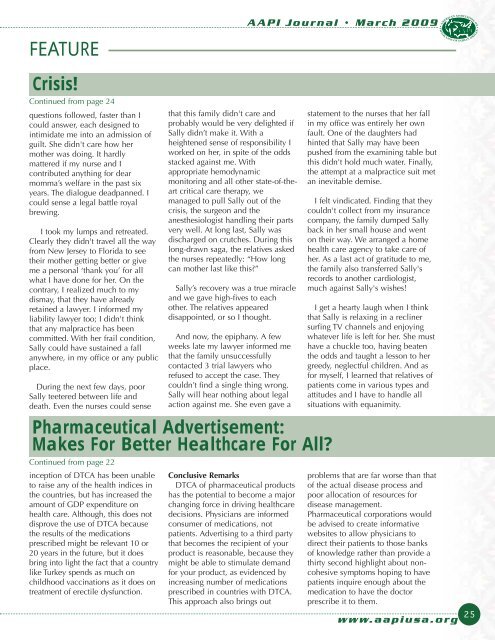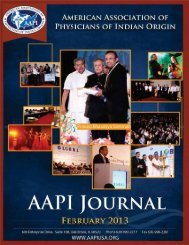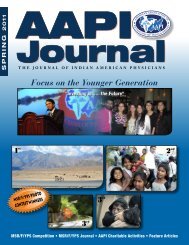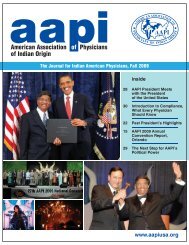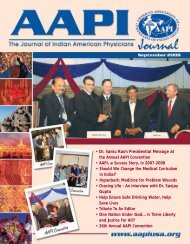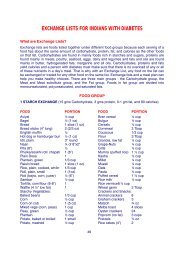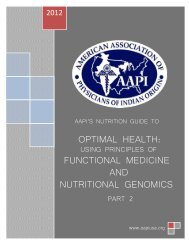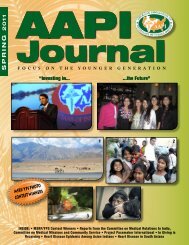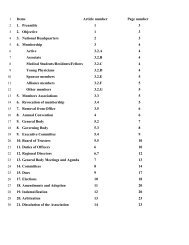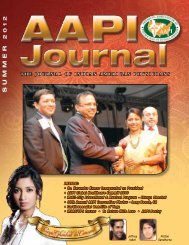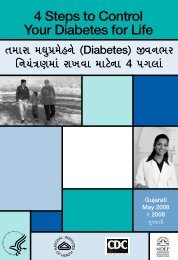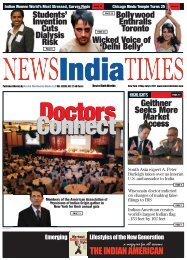Great Equalization: Is MBBS From India Equal To M.D. In U.S.A?
Great Equalization: Is MBBS From India Equal To M.D. In U.S.A?
Great Equalization: Is MBBS From India Equal To M.D. In U.S.A?
Create successful ePaper yourself
Turn your PDF publications into a flip-book with our unique Google optimized e-Paper software.
AAPI Journal • March 2009<br />
FEATURE<br />
Crisis!<br />
Continued from page 24<br />
questions followed, faster than I<br />
could answer, each designed to<br />
intimidate me into an admission of<br />
guilt. She didn't care how her<br />
mother was doing. It hardly<br />
mattered if my nurse and I<br />
contributed anything for dear<br />
momma’s welfare in the past six<br />
years. The dialogue deadpanned. I<br />
could sense a legal battle royal<br />
brewing.<br />
I took my lumps and retreated.<br />
Clearly they didn't travel all the way<br />
from New Jersey to Florida to see<br />
their mother getting better or give<br />
me a personal ‘thank you’ for all<br />
what I have done for her. On the<br />
contrary, I realized much to my<br />
dismay, that they have already<br />
retained a lawyer. I informed my<br />
liability lawyer too; I didn't think<br />
that any malpractice has been<br />
committed. With her frail condition,<br />
Sally could have sustained a fall<br />
anywhere, in my office or any public<br />
place.<br />
During the next few days, poor<br />
Sally teetered between life and<br />
death. Even the nurses could sense<br />
that this family didn't care and<br />
probably would be very delighted if<br />
Sally didn’t make it. With a<br />
heightened sense of responsibility I<br />
worked on her, in spite of the odds<br />
stacked against me. With<br />
appropriate hemodynamic<br />
monitoring and all other state-of-theart<br />
critical care therapy, we<br />
managed to pull Sally out of the<br />
crisis, the surgeon and the<br />
anesthesiologist handling their parts<br />
very well. At long last, Sally was<br />
discharged on crutches. During this<br />
long-drawn saga, the relatives asked<br />
the nurses repeatedly: “How long<br />
can mother last like this?”<br />
Sally’s recovery was a true miracle<br />
and we gave high-fives to each<br />
other. The relatives appeared<br />
disappointed, or so I thought.<br />
And now, the epiphany. A few<br />
weeks late my lawyer informed me<br />
that the family unsuccessfully<br />
contacted 3 trial lawyers who<br />
refused to accept the case. They<br />
couldn’t find a single thing wrong.<br />
Sally will hear nothing about legal<br />
action against me. She even gave a<br />
Pharmaceutical Advertisement:<br />
Makes For Better Healthcare For All?<br />
Continued from page 22<br />
inception of DTCA has been unable<br />
to raise any of the health indices in<br />
the countries, but has increased the<br />
amount of GDP expenditure on<br />
health care. Although, this does not<br />
disprove the use of DTCA because<br />
the results of the medications<br />
prescribed might be relevant 10 or<br />
20 years in the future, but it does<br />
bring into light the fact that a country<br />
like Turkey spends as much on<br />
childhood vaccinations as it does on<br />
treatment of erectile dysfunction.<br />
Conclusive Remarks<br />
DTCA of pharmaceutical products<br />
has the potential to become a major<br />
changing force in driving healthcare<br />
decisions. Physicians are informed<br />
consumer of medications, not<br />
patients. Advertising to a third party<br />
that becomes the recipient of your<br />
product is reasonable, because they<br />
might be able to stimulate demand<br />
for your product, as evidenced by<br />
increasing number of medications<br />
prescribed in countries with DTCA.<br />
This approach also brings out<br />
statement to the nurses that her fall<br />
in my office was entirely her own<br />
fault. One of the daughters had<br />
hinted that Sally may have been<br />
pushed from the examining table but<br />
this didn't hold much water. Finally,<br />
the attempt at a malpractice suit met<br />
an inevitable demise.<br />
I felt vindicated. Finding that they<br />
couldn't collect from my insurance<br />
company, the family dumped Sally<br />
back in her small house and went<br />
on their way. We arranged a home<br />
health care agency to take care of<br />
her. As a last act of gratitude to me,<br />
the family also transferred Sally's<br />
records to another cardiologist,<br />
much against Sally's wishes!<br />
I get a hearty laugh when I think<br />
that Sally is relaxing in a recliner<br />
surfing TV channels and enjoying<br />
whatever life is left for her. She must<br />
have a chuckle too, having beaten<br />
the odds and taught a lesson to her<br />
greedy, neglectful children. And as<br />
for myself, I learned that relatives of<br />
patients come in various types and<br />
attitudes and I have to handle all<br />
situations with equanimity.<br />
problems that are far worse than that<br />
of the actual disease process and<br />
poor allocation of resources for<br />
disease management.<br />
Pharmaceutical corporations would<br />
be advised to create informative<br />
websites to allow physicians to<br />
direct their patients to those banks<br />
of knowledge rather than provide a<br />
thirty second highlight about noncohesive<br />
symptoms hoping to have<br />
patients inquire enough about the<br />
medication to have the doctor<br />
prescribe it to them.<br />
www.aapiusa.org<br />
25


